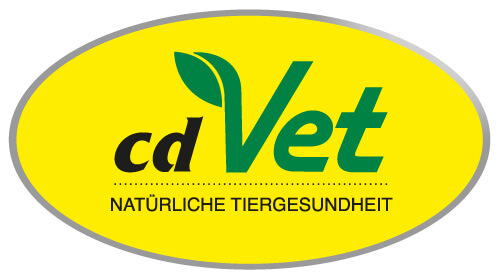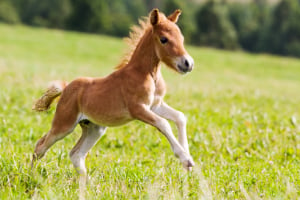
Für einen gelungenen Start ins Pferdeleben
Eine Pferdestute ist zwischen 315 und 340 Tage lang tragend. Nach der Geburt ist das Fohlen bereits wenige Minuten später fähig aufzustehen. Dies ist wichtig, damit sich die Lungen entfalten können und das Fohlen die erste Muttermilch zur Stärkung zu sich nehmen kann. Weitere Produkte zum Thema Fohlen und Zucht bietet cdVet an, um eine natürliche Fohlengesundheit zu unterstützen.
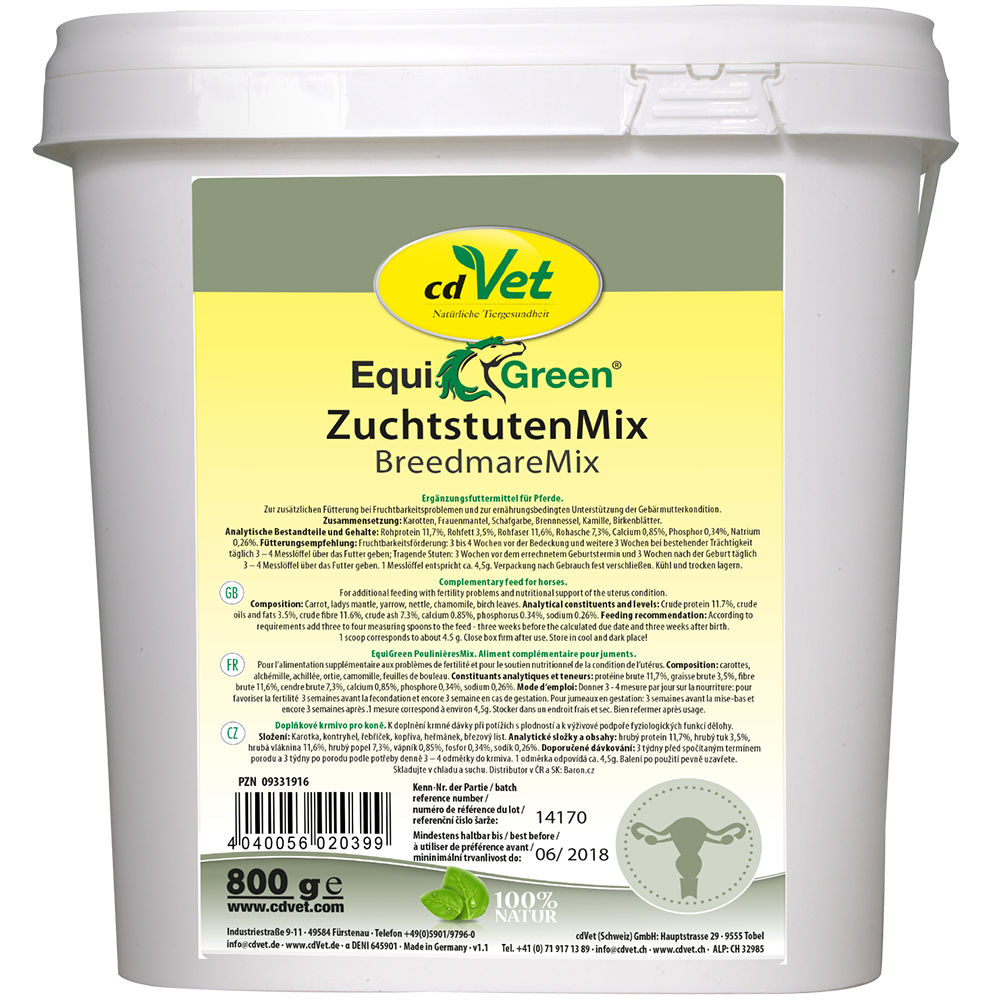
EquiGreen BroodmaresMix 800 g
Complementary feed (powder, coarse structure) for maresFor additional feeding in the event of fertility problems and for nutrition-related support of the uterine conditionEquiGreen BroodmaresMix has been developed to nutritionally support the mare‘s fertility. This special blend can promote blood circulation in the uterus, strengthen its muscles and thus facilitate the birth process and subsequent regeneration of the mare. EquiGreen BroodmareMix compensates for nutritional imbalances in the last weeks of gestation and in the first lactation phase and activates the metabolism.Herbs & FertilityThe minerals, trace elements and vitamins contained in herbs can compensate for the lack of herbs in today‘s meadows and thus provide a wide range of support during birthing:Fertility-supporting herbs stimulate and regulate the hormone balance and thus also ovulation (or the production of the corpus luteum for implantation of the egg).Phytohormones strengthen the uterine tissue and can support the birth and foaling process.The physiological detachment of the placenta is naturally supported.Vitamins & FertilityThe feeding of a not in foal mare should be adapted to her actual energy and micronutrient requirements:Special features, such as a lactating mare, must be taken into account.Nutrient deficiencies should be compensated for before the mating, in order to promote the probability of a good intake and healthy foal development.Vitamin A, is the `fertility vitamin´ - a deficiency can lead to loss of fertility or malformations, even death of the embryo.An additional supply of ß-carotene before conception and during gestation is therefore recommended.Composition: carrots, ladys mantle herb, birch leaves, stinging nettle herb, chamomile blossoms, yarrow herb.Analytical constituents: crude protein 11.7%, crude fat 3.5%, crude fiber 11.6%, crude ash 7.3%, calcium 0.85%, phosphorus 0.34%, sodium 0.26%.Feeding recommendation: Add 15-20 g/animal to the feed daily. 1 tbsp. corresponds to approx. 4 g. Fertility promotion: 3-4 weeks before covering and a further 3 weeks during existing gestation. Gestating mares: 3 weeks before the expected date of foaling and 3 weeks after the foaling.Store it cool and dry.
Content: 0.8 Kilogramm (€47.44 / 1 Kilogramm)
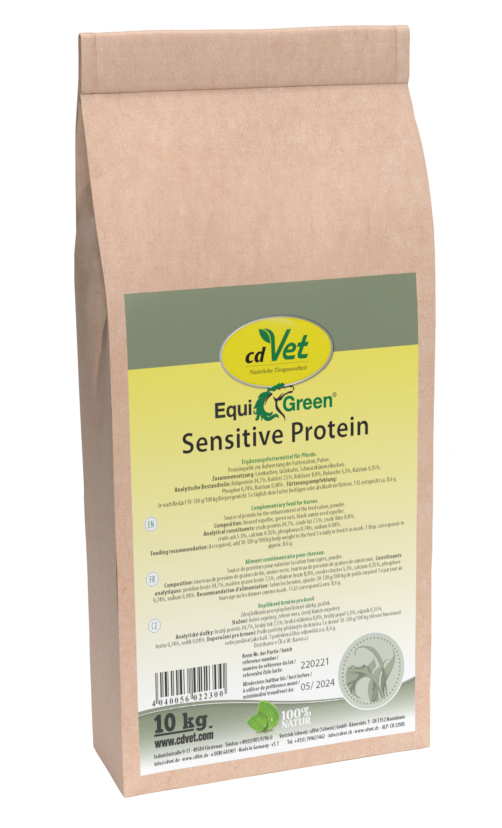
EquiGreen Sensitive Protein 10 kg
Complementary feed for horsesSource of protein for the enhancement of the feed ration, powderNot all hay is the sameIn some years, hay quality often presents horse owners with a major challenge, and they do not always have the opportunity to change anything themselves. Especially in 2022, the hay quality in the analyses shows low values in the area of digestible crude protein and, in comparison, very high sugar values.Proteins are the building materials of the body. They are needed for daily renewal processes, muscle development and maintenance, and cell regeneration. Thus, a low-protein hay is a special challenge for all horses in active training, in the use of mating, in growth, for horses with an increased protein requirement due to muscle diseases, and for seniors.The high sugar levels, in turn, pose an increased risk for all metabolically sensitive horses. EquiGreen Sensitive Protein can have a positive influence on the insulin sensitivity of the cells and the blood sugar level. Valuable protein sources in the form of gently processed oil press expeller supply your horses with essential amino acids and provide important energy for the supply of muscles and body. In winter, EquiGreen Sensitive Protein can help to maintain the muscles and provide sufficient building materials for the constant renewal processes.Composition: linseed expeller, green oats, black cumin seed expeller.Analytical constituents: crude protein 34.7%, crude fat 7.5%, crude fiber 8.8%, crude ash 5.3%, calcium 0.35%, phosphorus 0.74%, sodium 0.08%.Feeding recommendation: As required, add 10-130 g/100 kg body weight to the feed 1 x daily or feed it as mash. 1 tbsp. corresponds to approx. 8.6 g.
Content: 10 Kilogramm (€5.00 / 1 Kilogramm)
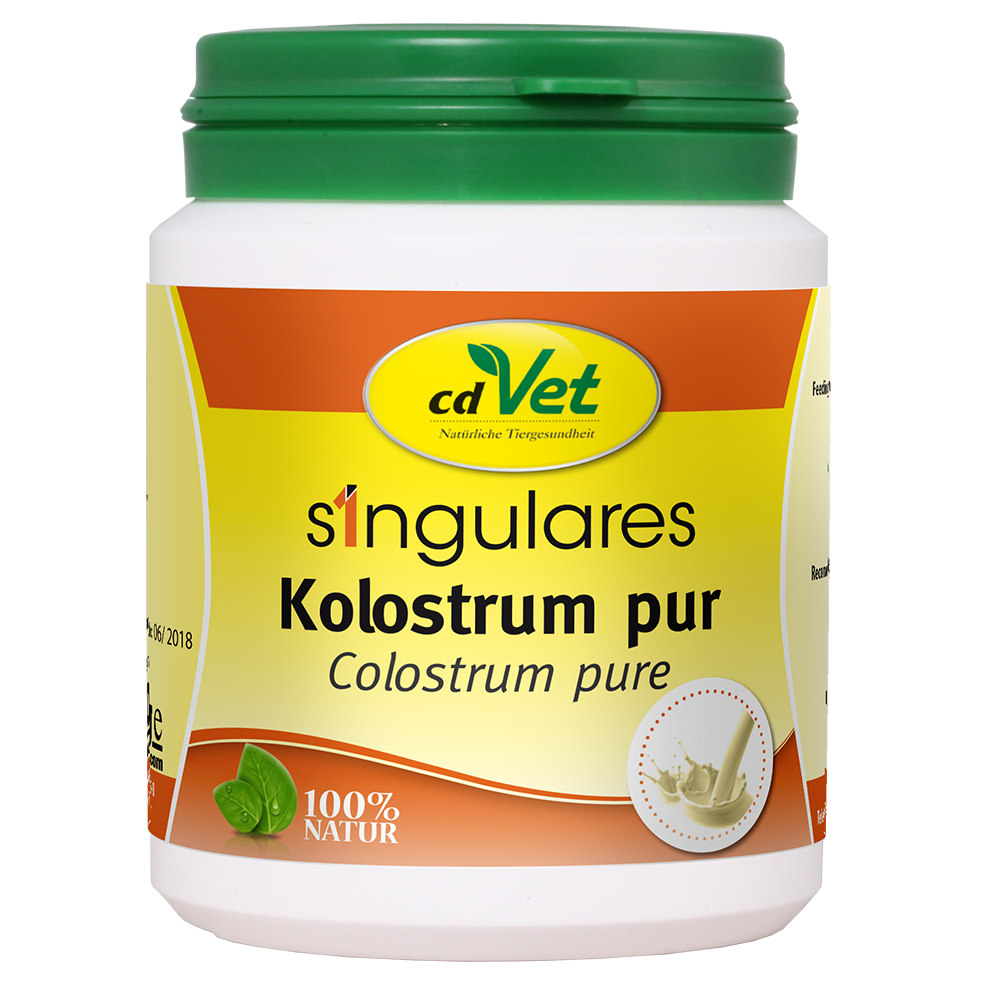
Singulares Colostrum pure 100 g
Feed material For the nutritional-related strengthening of the immune system and organism - immunoglobulins, vitamins, minerals, and amino acidsColostrum, also called foremilk or beestings mild, is one of the oldest and most extraordinary foods found in nature. Colostrum is unique - in addition to vitamins, minerals, trace elements, essential and non-essential amino acids, colostrum provides natural immune and growth factors in a unique variety and concentration not found in any other plant or chemical product!Singulares Colostrum pure is particularly gently dried. We have deliberately chosen bovine colostrum because cows have relatively high surplus quantities during the first milkings (in contrast to sheep and goats), so that sufficient colostrum is also available for the calf.Singulares Colostrum pure has proven itself:for the natural strengthening of the entire immune systemconcentrated nutrient cocktail to strengthen malnourished, weak animalsto strengthen mother animals, before and after birthas a complement to maternal milkto strengthen the vital functions of older and young animalsExpert Tip: For orphaned puppies and kittens we recommend cdVet Puppy Milk and feliTATZ Kitten Milk, respectively, as a replacement milk.What amount of colostrum should be fed?The condition of the newborn is decisive for the feeding quantity. If the young animal is not getting enough, it signals this by restlessness and/or audible crying. Then check whether the solution has not been diluted too much. If the young animal reacts with digestive disorders, the concentration will be reduced.Composition: 100% bovine colostrum.Analytical constituents and levels: crude protein 45%.Feeding recommendation for adult/young animals: Dog/cat: 1 g/10 kg body weight per day. Horse/pony/donkey: 5 g/100 kg body weight per day. Pigeon: 2 g/kg feed or 2 g/L drinking water. 1 heaped tsp. corresponds to approx. 4 g.Feeding recommendation in case of loss of the mother : Mix colostrum with 50°C warm water without lumps, or shake well in a bottle, feed at body temperature (37°C). Puppy/kitten: mix 10 g with 30 ml water. Lamb/cria/piglet: mix 75 g with 225 ml water, feed the finished mixture within 5 hours. Foal: mix 300 g with 900 ml water. The amount of liquid should be 3-5 L in the first 24 hours. 1 heaped tbsp. corresponds to approx. 16 g.The specified feeding quantities are only guidelines. However, those must be adapted to the individual needs and condition of your young animal. The feeding quantity can be increased for strong young animals. Colostrum should be given as soon as possible after birth (ideally in the first 2 hours), then every 1-2 hours and supplemented with a good replacement milk within 24 hours!
Content: 0.1 Kilogramm (€379.50 / 1 Kilogramm)
Stallions are usually castrated between 1 and 2 years of age, before they reach sexual maturity. The exact timing of castration can depend on several factors, including individual health, breeding plans and personal preferences. Some horse owners prefer early castration, while others wait for later castration to ensure the horse has sufficient time for growth and development.
Mares have a natural reproductive cycle known as estrus. The normal estrus cycle lasts about 21 days, but can vary individually. A mare can be in estrus for about seven to nine days on average. Under normal conditions, several estrus periods occur throughout the year. The exact frequency can depend on factors such as time of year, light conditions, and individual differences. It is important to monitor the mare's cycle, especially if she is being used for breeding, to determine the optimal time for mating.
The frequency with which a horse can have foals depends on several factors, including the health of the mare and recommended breeding practices. Typically, mares become pregnant once a year or every 18 to 24 months to allow adequate recovery time and good care for the mare and foal. Reproduction too frequently can lead to health problems in the mare. It is important to consider the individual needs of the mare and seek veterinary advice to ensure optimal conditions for successful breeding.
Sexual maturity in horses typically occurs at around 12 to 18 months of age, but can vary depending on breed and individual developmental differences. In mares and stallions, first estrus or first impregnation can occur at around 12 to 18 months of age. It is important to note that true breeding maturity, at which a mare can successfully conceive, is not usually reached until around three years of age to ensure healthy physical and mental development.
A stallion's ability to mate depends on several factors, including his physical development and maturity. Generally, stallions reach sexual maturity between 12 and 20 months of age. However, the exact time may vary individually, and it is important to consider the stallion's physical and mental maturity, as well as the recommendations of an experienced breeder or veterinarian, before using him for mate.
